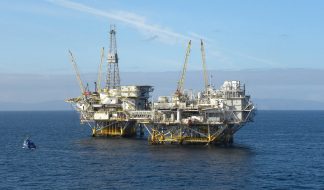 Offshore drilling for oil and natural gas is detrimental to the environment, but economically beneficial for the energy industry in the United States. Before the end of his second term in office, former U.S. President Barack Obama issued a ban on offshore drilling.
Offshore drilling for oil and natural gas is detrimental to the environment, but economically beneficial for the energy industry in the United States. Before the end of his second term in office, former U.S. President Barack Obama issued a ban on offshore drilling.
Recently, President Trump declared his intentions to lift the ban and allow energy companies to resume offshore drilling. Some governors of coastal states have objected and the Trump administration, in response to the Florida governor, initially said that Florida was exempt from any expansion of drilling leases. Since then, however, there have been conflicting reports from the administration.
In the space below, we have compiled some resources to help readers understand the issues and its significance.
News articles to frame the issue
- New York Times, Trump Would Open Nearly All U.S. Waters to Drilling. But Will They Drill?
January 23, 2018 - Washington Post, Frustrated governors still waiting for offshore drilling meeting with Trump administration
January 18, 2018 - New York Times, Trump moves to open nearly all offshore waters to drilling, January 4, 2018,
- Politico, Trump aims to open California, Florida, Atlantic waters for oil drilling, January 4, 2018
- Science, Trump proposes vast expansion of offshore drilling, January 4, 2018
Freely available government and nonprofit sources
- Offshore Oil and Gas Explained, U.S. Energy Information Administration
- Environmental Stewardship & Offshore Oil and Gas, Bureau of Ocean Energy Management
- of Interior Press Release: Secretary Zinke Announces Plan For Unleashing America’s Offshore Oil and Gas Potential, January 4, 2018
- 2019-2024 National Outer Continental Shelf Oil and Gas Leasing Program Overview and Information, Bureau of Ocean Energy Management
- How Oil Harms Animals and Plants in Marine Environments, NOAA Office of Response and Restoration
- Environmental Stewardship, Bureau of Ocean Energy Management
University of Minnesota Libraries Resources
- Mukherjee, D. and Rahman, M.A. 2016. To drill or not to drill? An econometric analysis of US public opinion. Energy Policy 91: 341-351. DOI: 10.1016/j.enpol.2015.11.023
- Bennear, Lori S. 2015. Offshore oil and gas drilling: A review of regulatory regimes in the United States, United Kingdom, and Norway. Review of Environmental Economics and Policy 9(1): 2-22.
- Ivshina, I.B., Kuyukina, M.S., Krivoruchko, A.V., Elkin, A.A., Makarov, S.O., Cunningham, C.J., Peshkur, T.A., Atlas, R.M., and Philp, J.C. Oil spill problems and sustainable response strategies through new technologies. 2015. Environmental Science – Processes & Impacts. 17(7): 1201-1219. DOI: 10.1039/c5em00070j
- Ellis, J.I., Fraser, G., and Russell, J. 2012. Discharged drilling waste from oil and gas platforms and its effects on benthic communities. Marine Ecology Progress Series. 456: 285-302. DOI: 10.3354/meps09622
- Kingston, P.F. 2002. Long-term environmental impact of oil spills. Spill Science & Technology Bulletin. 7(1–2): 53-61. DOI: 10.1016/S1353-2561(02)00051-8.
U of M research and expertise (Experts@UMN)
- Emmanuel M Detournay, Professor, Civil, Environmental, and Geo-Engineering
- Steven S. Shen, Professor, Biomedical Health Informatics
University of Minnesota librarians
- Carolyn Bishoff, Physics, Astronomy, and Earth Sciences Librarian
- Shannon Farrell, Natural Resources Librarian
- Alicia Kubas, Government Publications Librarian




